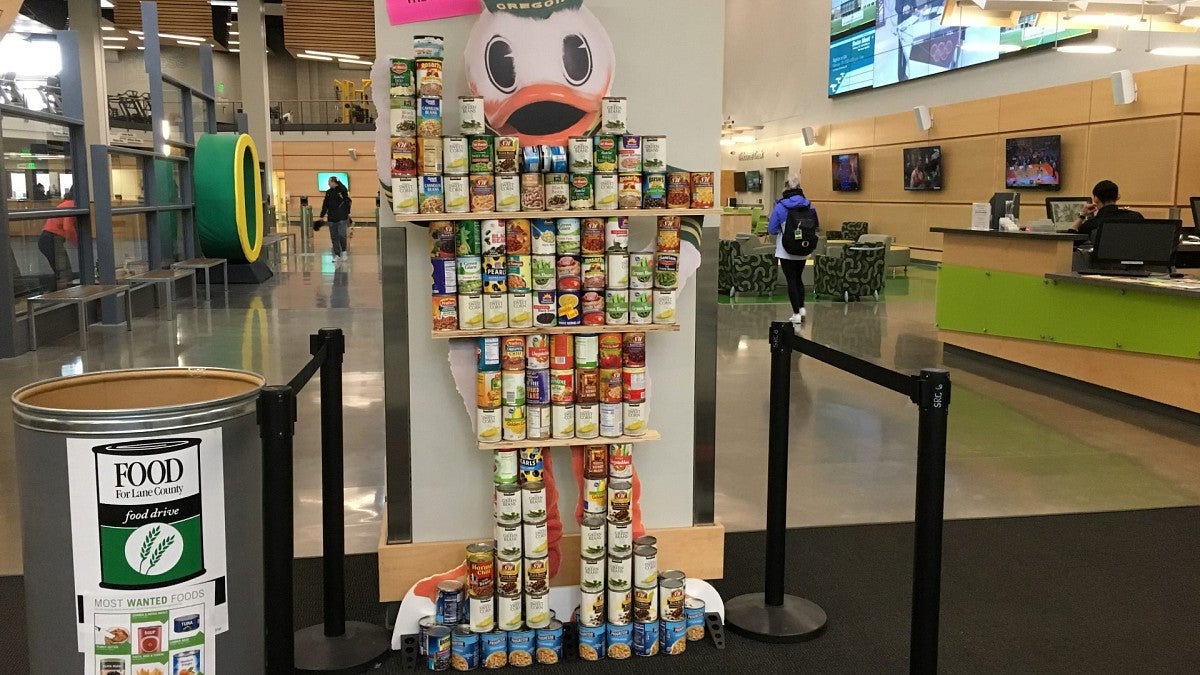Food insecurity is a concern for many University of Oregon students, but it also has had a profound effect on employees. As the Governor's State Employees Food Drive begins its third week, staff are sharing their experiences and hoping to bring awareness to the pervasive nature of food insecurity within the wider Lane County community. Many food drive coordinators have felt the effects of food insecurity themselves and want to help ensure currents students and community members get access to food.
Echo Mendiguren-Dalton, development assistant for the School of Law, shared her experience of growing up in Lane County in a food insecure household that relied on food banks and other assistance. Her mom was a full-time student at UO while working a full-time job, struggling to afford food until she was introduced to the resources offered by FOOD for Lane County and WIC (Women, Infants, Children supplemental nutrition program).
"My mom had to make tough decisions every month: 'Buy my textbooks for the term or feed myself and my child? Study for my finals or pick up more shifts to be able to afford food?'" Mendiguren-Dalton said. "As you think about whether or not to donate this month, please remember how much better a student can succeed when they are able to focus on the lecture … and not their next meal."
Teresa Bonomini, an HR specialist with the Office of Human Resources, also experienced food insecurity in college as she was unable to get assistance from family who were facing their own financial struggles. At the time she supported herself by working a full-time job, taking out loans and relying on scholarships.
"At the end of each month, I did not have enough to purchase enough food to feed myself. This, coupled with a very limited knowledge of cooking, there were plenty of days I skipped meals," Bonomini said. "I feel a lot of empathy for college students that could be struggling. Even though I do not work with the student body directly, I am aware that there are likely students on campus suffering quietly as I did out of embarrassment or lack of knowledge that there is assistance out there."
Food insecurity is often highly stigmatized and can leave people too ashamed to seek assistance or share their experiences. Many students rely on SNAP assistance, and likely face a similar stigma.
"The handful of years I spent being a single parent and working at UO while still having to rely on SNAP not only made me feel like a failure, the limitations of what we were allowed to buy had a life-long impact on my child," said Lo Owens, a faculty support coordinator for the College of Arts and Sciences, "It was difficult, humiliating and infuriating."
While self-consciousness about one's food insecurity was a common sentiment among the staff interviewed, so was gratitude for the public and private food resources that exist in the local community, and the donors who make it possible.
"To this day, many of my favorite foods and favorite recipes came from foods that were often received from the food bank or from items that WIC was eligible for," Mendiguren-Dalton said. "I am not exaggerating when I say that without the assistance my mother received as a student from FOOD for Lane County … I would not be where I am today."
The Governor's Food Drive is great way for employees to help support Oregon Food Bank Network partners such as FOOD for Lane County and their beneficiary food pantries including the Student Food Pantry. The food drive runs through February 29. See the department' coordinators for more information or visit the UO Governor's State Employees Food Drive website.


